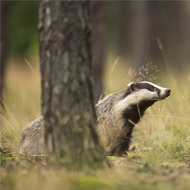New book claims badger cull is "short-sighted"

Figures published in December revealed that more than 10,000 badgers have been culled so far in efforts to prevent the spread of bTB.
Efforts to control bovine tuberculosis (bTB) should be informed by greater scientific analysis of the roots of the disease, according to new findings.
Since 2008, more than 244,000 cattle have been culled in England because of bovine TB. In his new book, Peter Atkins - an emeritus professor at Durham University - suggests a resolution to the problem is “decades” away.
“Whilst media interest focuses on badger culling - almost 11,000 badgers were killed last year as part of a government plan to control the spread of Bovine TB - the situation is far more complex than headlines suggest,” he explains.
“My book reports that bovine TB caused 600,000 British deaths between 1848 and 1960, mainly due to non-pasteurised milk and undercooked meat - a little-reported fact.”
For the past 40 years, Professor Atkins has studied diseases through the food system. Speaking at the launch of A History of Uncertainty: Bovine Tuberculosis in Britain, 1850 to the Present, he said that the badger cull debate has become political rather than scientific.
“Identifying badgers as the main cause of TB is, frankly, short-sighted’,” he said. “It’s far better to see the disease in its ecological system, in which cattle will probably have given the disease to badgers in the first place and the infection has then been changed back and forward between species (including humans at one point) for decades, possibly centuries.”
Figures published in December revealed that more than 10,000 badgers have been culled so far in efforts to prevent the spread of bTB. Currently, efforts are focused on Somerset, Gloucestershire, Devon, Cornwall and Herefordshire. But Professor Atkins argues that other parts of the country were more affected by Bovine TB in the past.
“North West England and Scotland were the original centres of the disease,” he said, “How and why geography has moved has not been explained by science - and we, therefore, need to be mindful that all parts of the UK are at risk of bovine TB.”
“The evidence shows that bovine TB is spreading - we can see it moving away from the South West into the West Midlands and Wales, whether that is through badgers or through cattle-to-cattle.”
A History of Uncertainty: Bovine Tuberculosis in Britain, 1850 to the Present is published by Winchester University Press.



 The Veterinary Medicines Directorate (VMD) is inviting applications from veterinary students to attend a one-week extramural studies (EMS) placement in July 2026.
The Veterinary Medicines Directorate (VMD) is inviting applications from veterinary students to attend a one-week extramural studies (EMS) placement in July 2026.